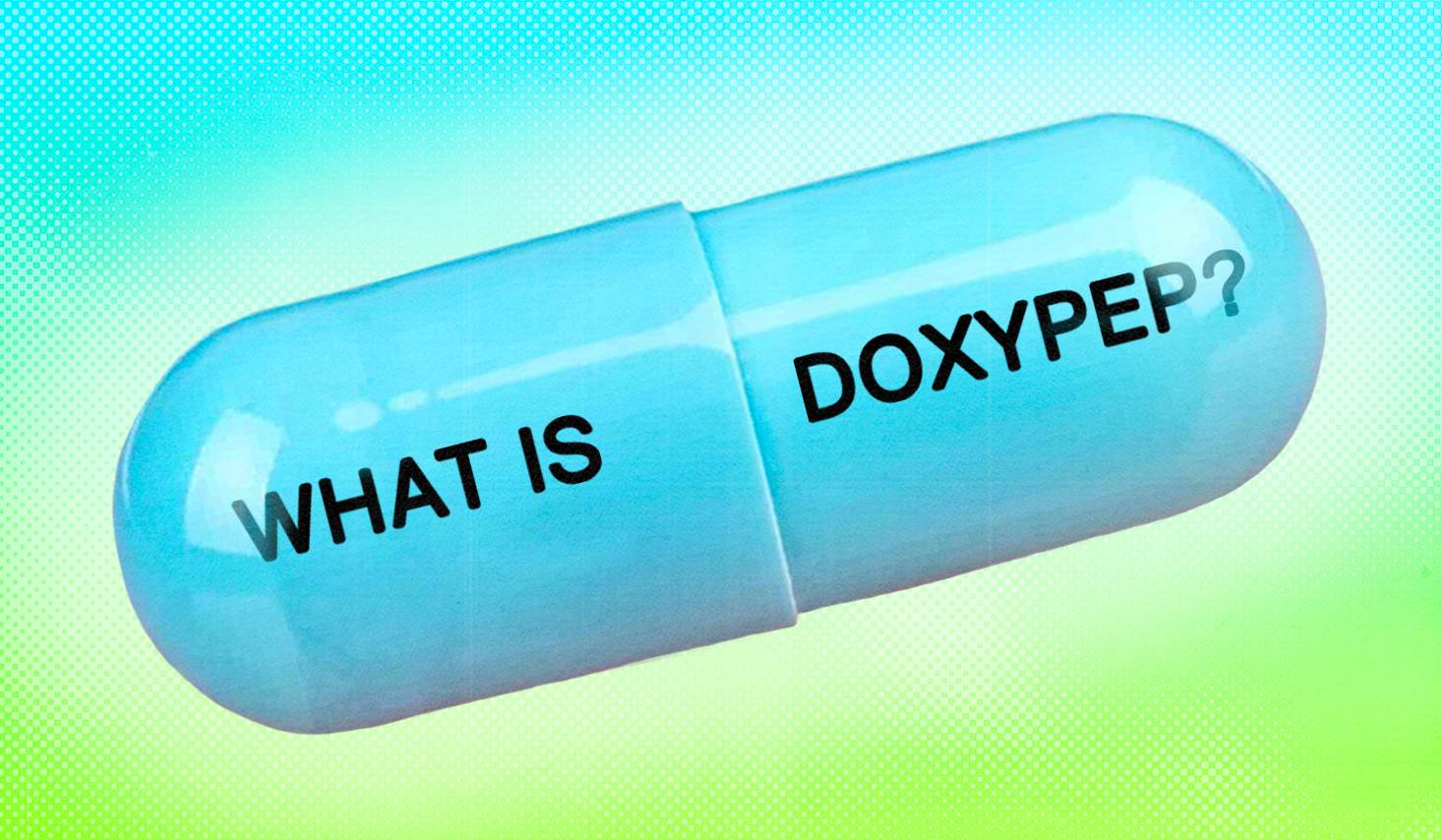
As sexually transmitted infections (STIs) continue to be diagnosed at record levels, sexual health experts are continuously looking for new ways to stop the spread. Doxycycline post-exposure prophylaxis, known more commonly as DoxyPEP, is among the latest innovations being considered as a way of protecting those who are most at risk. Despite not yet being rolled out in the UK, DoxyPEP has seen success at sexual health clinics in cities like San Francisco, fuelling discussion over whether or not this should be replicated elsewhere – but what is it, are there side effects and what STIs does it help prevent? GAY TIMES worked with Dr. Benjamin Weil, Programme Coordinator: Community Knowledge Generation and Research at The Love Tank, a not-for-profit community interest community that promotes the health and wellbeing of underserved groups, to tell you what you need to know about DoxyPEP.
What is DoxyPEP?
DoxyPEP is a way of preventing bacterial sexually transmitted infections (STIs) by taking a dose of the doxycycline antibiotic after having sex. “Essentially, what it involves is taking a single dose of an antibiotic within 72 hours after having sex,” Dr. Weil told GAY TIMES. “It can prevent things like chlamydia, syphilis and, to a certain extent, gonorrhoea and other more obscure STIs like mycoplasma genitalium.”
Doxycycline typically comes in the form of capsules and tablets, as well as tablets which dissolve in water. According to the NHS, it can treat a variety of things including chest, dental and skin infections, as well as STIs. In the US, it is already commonly prescribed as post-exposure prophylaxis (PEP) to prevent Lyme disease and leptospirosis from developing after suspected exposure.
Does it prevent all STIs?
Given that DoxyPEP is an antibiotic, it only helps to prevent bacterial STIs such as chlamydia, gonorrhoea and syphilis.
STIs caused by viruses (such as HIV and hepatitis B) or parasites (like crabs and scabies) will not be prevented by DoxyPEP.
How effective is it?
DoxyPEP has been shown to work well at preventing bacterial STIs. Queer Health, which is fuelled by The Love Tank, cites three clinical studies that have assessed the efficacy of DoxyPEP:
- IPERGAY: This study, which was conducted in France in 2017, examined the effect DoxyPEP had in men who have sex with men and take PrEP to prevent HIV. Researchers found that DoxyPEP had no effect on gonorrhoea, though this is believed to have been linked to high levels of doxycycline-resistant gonorrhoea circulating in the country at the time.
- DoxyPEP: This study took place across Seattle and San Francisco in 2022 and looked at the effect of DoxyPEP in men who have sex with men, as well as trans women with a history of STI infections. Participants included people living with HIV and HIV-negative people taking PrEP.
- DoxyVAC: This study from 2022 in France looked at the effects of DoxyPEP (as well as the meningococcal B vaccine) in men who have sex with men. Participants included people living with HIV and HIV-negative people taking PrEP. Researchers found that DoxyPEP managed to prevent about half of gonorrhoea cases, an improvement from what the IPERGAY study found five years earlier.
These trials have indicated that DoxyPEP is 70-89 per cent effective at preventing chlamydia and 73-87 per cent effective at preventing a syphilis infection. This figure is slightly lower when it comes to gonorrhoea, with a 51-57 per cent efficacy rate. Syphilis and chlamydia are not believed to have developed any significant resistance to tetracyclines, which are the class of antibiotics that doxycycline belongs to. This is believed to be the reason for the efficacy of these not varying largely between any of the aforementioned studies. In the UK, there are quite high levels of resistance to doxycycline, making it less clear how effective DoxyPEP could be if rolled out in the country.
“What we know from the evidence is that DoxyPEP is particularly effective at preventing chlamydia and syphilis infection and that’s actually really, really important because we are currently seeing record rates of syphilis in lots of different metropoles across the world, so DoxyPEP could be really useful for that,” says Dr. Weil. “But some of the evidence in terms of how effective DoxyPEP is at preventing gonorrhoea is a bit more mixed. Now, when I say it’s mixed, I mean it ranges from effective to moderately effective – we’re not talking about ineffective.”
Are there any side effects?
Doxycycline is a generally well-tolerated medication that most people will experience no side effects from. According to the NHS, one in 10 people tend to experience them and these are usually very mild. Side effects can include:
- Headaches;
- Nausea and/or vomiting;
- Increased sensitivity to sunlight.
Dr. Weil says these are all “manageable” and recommends drinking a big glass of water when taking a dose of DoxyPEP, as well as remaining upright while doing so and – if you can – take it with food. If you experience more serious side effects, the NHS recommends consulting with a doctor.
Can taking DoxyPEP make you resistant to antibiotics?
“No, that’s not the case,” Dr. Weil explains. “Antibiotic resistance – or, more specifically, antimicrobial resistance – is not a property or a characteristic of a human being, it’s a property of a bacteria. So if you take an antibiotic, you can’t become more resistant to it and it will not be less effective in your body. What can happen is that certain classes of bacteria can acquire genetic traits that make antibiotics less effective at eliminating them. So we associate higher rates of antimicrobial resistance typically with higher rates of using antibiotics.”
They add that there “have been some concerns” over DoxyPEP because encouraging people to take antibiotics as a form of preventing STIs may lead to an “increase in the amount of antibiotics being used and therefore an increase in antimicrobial resistance in the classes of bacteria that the antibiotics are being used to prevent.” However, he notes that there are currently very few signs that chlamydia or syphilis are capable of acquiring antimicrobial resistance to tetracyclines. On the other hand, studies have found evidence of gonorrhoea acquiring antimicrobial resistance, but Dr. Weil says this “is not particularly alarming” at this time.
Who could DoxyPEP be useful for?
Anyone who is having condomless sex can benefit from DoxyPEP, especially those who are at a heightened risk of acquiring a bacterial STI. In the UK, current data suggests that this is gay, bisexual and other men who have sex with men, but that does not mean they are the only group who could consider DoxyPEP.
“I believe that we should have as few barriers as possible to accessing tools for things like STI prevention as possible. So just like with HIV PrEP, I would say whoever feels that they need this could stand to benefit from it,” adds Dr. Weil. “That could run the gamut from sex workers who are having sex regularly with clients and want an added layer of protection, because getting an STI is the difference from being able to work and not being able to work, and I would say that would apply across gender. Also, it could apply to gay and bisexual men who are having sex regularly or maybe going to sex parties and having lots of partners.”
Can I get DoxyPEP on the NHS?
Doxycycline is currently available on the NHS for things like chest infections and rosacea, but it is not yet approved for use as DoxyPEP in the UK. Although it’s unclear if this is likely to change anytime soon, Dr. Weil notes that “it’s currently in review” and “there’s no reason not to have optimism about that”.
“We’ve seen DoxyPEP being implemented and adopted – I would say successfully so far – in places like San Francisco and Seattle and we’ve seen that the clinical trial data is good. So all of those signs suggest there’s reason for optimism, as well as, I think, discussions about cost efficacy and cost effectiveness,” they continue. “That said, DoxyPEP is just one of a number of new strategies that are being explored to revolutionise and approach this particular moment of ‘STI history’ we find ourselves in, which is, as we know, record rates and increases in acquisitions among certain demographics.”
For more information on DoxyPEP, visit Queer Health’s guide here.



